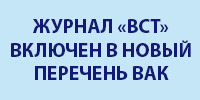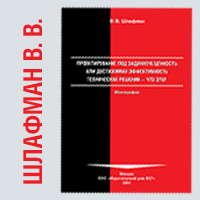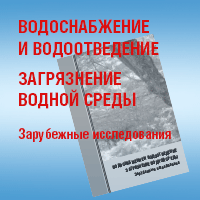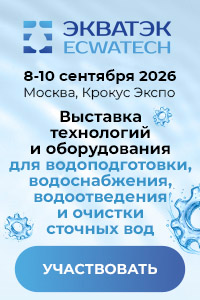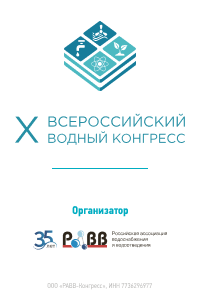№10|2023
WATER RECYCLING SYSTEMS
UDC 628.387+330.322.5
DOI 10.35776/VST.2023.10.05
Improving the efficiency of water recycling systems at oil refineries and petrochemical enterprises (part 2)
Summary
Comprehensive studies were carried out to improve the efficiency of water and wastewater treatment facilities at one of the oil refineries in the Southern Federal District by adding one or more stages of tertiary treatment; by improving the design of the existing facilities; and replacing the technological process of one of the treatment stages for a more efficient one. Research objectives: 1) analysis of the operation of the water recycling systems (units), existing wastewater disposal and treatment facilities; 2) development of the optimal solutions and schemes for upgrading the recycling water supply of the enterprise; 3) development of technical measures aimed at increasing the efficiency of the water recycling system, reducing the volume of wastewater discharged by the plant and reducing the amount of raw water abstraction by arranging the makeup of the existing water recycling units with effluent. The previous article on this topic presented the research materials on the first two tasks.
Key words
sewerage treatment facilities , water recycling facilities , industrial wastewater treatment , zero discharge system , pilot tests , feasibility study
For citation: Vurdova N. G., Fesenko L. N. Improving the efficiency of water recycling systems at oil refineries and petrochemical enterprises (part 2). Vodosnabzhenie i Sanitarnaia Tekhnika, 2023, no. 10, pp. 37–47. DOI: 10.35776/VST.2023.10.05. (In Russian).
The further text is accessible on a paid subscription.
For authorisation enter the login/password.
Or subscribe
REFERENCES
- Nazarov V. D., Aksenov V. I. Vodnoe khoziaistvo promyshlennykh predpriiatii [Industrial water supply. Reference book. Book 5. Edited by V. I. Aksenov. Moscow, Teplotekhnik Publ., 2008, 439 p.].
- Voronov Iu. V., Iakovlev S. V. Vodootvedenie i ochistka stochnykh vod [Wastewater disposal and treatment. Moscow, ASV Publ., 2006, 704 p.].
- Burenin V. V. [New methods and equipment for the purification of oil-contaminated industrial wastewater from oil and gas enterprises]. Neftegaz.RU, 2022, no. 2 (122), pp. 88–96. (In Russian).
- Timonin A. S., Abiev R. Sh., Golubeva O. A., Gonopol’skii A. M., Dmitriev S. M., Sanches A. B., et al. Inzhenerno-ekologicheskii spravochnik [Engineering and environmental reference book]. Under the general editorship of A. S. Timonin. V. 1. Kaluga, Noosfera Publ., 2015, 1148 p.].
- Abuhasel K., Kchaou M., Alquraish M., Munusamy Y., Jeng Y. T. Oily wastewater treatment: Overview of conventional and modern methods, challenges, and future opportunities. Water, 2021, no. 13, 980. DOI: 10.3390/w13070980.
- Vurdova N. G., Lishchuk A. N. [The influence of environmental and economic risks on the efficiency of the investment and construction project for the reconstruction of refinery treatment facilities]. Zashchita okruzhaiushchei sredy v neftegazovom komplekse, 2023, no. 3 (312), pp. 23–31. DOI: 10.33285/2411-7013-2023-3(312)-23-31. (In Russian).
- Berezin S. E., Pupyrev E. I., Bazhenov V. I., Samburskii G. A. [Development of the method of life cycle costing of the equipment, systems and facilities for water supply and wastewater disposal]. Vodosnabzhenie i Sanitarnaia Tekhnika, 2018, no. 2, pp. 10–20. (In Russian).
- Shvetsov V. N., Morozova K. M., Nechaev I. A., Kiristaev A. V. [Theoretical and technological aspects of the application of biomembrane technologies for enhanced wastewater treatment]. Vodosnabzhenie i Sanitarnaia Tekhnika, 2007, no. 1, pp. 10–13. (In Russian).
- Kasibhatla M., Anand R. Aerobic membrane bioreactor for the efficient wastewater treatment: recent advances / Membrane-based hybrid processes for wastewater treatment. 2021, рр. 615–632. DOI: 10.1016/B978-0-12-823804-2.00020-3.
- Yalcinkaya F., Boyraz E., Maryska J., Kucerova K. A review on membrane technology and chemical surface modification for the oily wastewater treatment. Materials, 2020, no. 13 (2), 493. DOI: 10.3390/ma13020493.
- Cerqueira A. A., Souza P. S. A., Marques M. R. C. Effects of direct and alternating current on the treatment of oily water in an electroflocculation process. Brazilian Journal of Chemical Engineering, 2014, no. 31, pp. 693–701. doi: 10.1590/0104-6632.20140313s00002363.
- Moskvicheva E. V., Strepetov I. V., Moskvichev S. S. [Preparing sorbents from aluminosilicate waste of an oil refinery]. Vestnik VolgGASU, Series: Construction and Architecture, 2008, is. 12 (31), pp. 101–104. (In Russian).
- Vurdova N. G., Fesenko L. N. [Improving the efficiency of water recycling systems at oil refineries and petrochemical enterprises (part 1)]. Vodosnabzhenie i Sanitarnaia Tekhnika, 2023, no. 6, pp. 12–22. DOI: 10.35776/VST.2023.06.02. (In Russian).
- Fesenko L. N., Ignatenko S. I., Cherkesov A. Iu., Kostiukov V. P. [Improving the technology for the purification of highly concentrated sulfide wastewater]. Vodosnabzhenie i Sanitarnaia Tekhnika, 2012, no. 4, pp. 67–73. (In Russian).
- Cherkesov Iu. A. [Iron-catalytic technology for the purification of highly concentrated hydrogen sulfide-containing wastewater of oil and synthetic plants. Vodosnabzhenie i Sanitarnaia Tekhnika, 2020, no. 11, pp. 16–26. (In Russian).
- Stepanov S. V., Strelkov A. K., Shvetsov V. N., Morozova K. M. Biologicheskaia ochistka stochnykh vod neftepererabatyvaiushchikh zavodov [Biological treatment of oil refinery wastewater. Moscow, ASV Publ., 2017, 204p.].
- Zhaskairatov T. E., Masakbaeva S. R., Baimakhambetova M. G. [Effective methods in wastewater desalting technology at oil refineries]. Tekhnicheskie Nauki – ot Teorii k Praktike, 2016, no. 4 (52), pp. 160–170. (In Russian).
- Vurdova N. G., Iur’ev Iu. Iu. [Investment project for designing closed water circulation cycles at an industrial enterprise]. Izvestiia Vuzov. Investitsii. Stroitel’stvo. Nedvizhimost’, 2022, v. 12, no. 4, pp. 529–538. DOI: 10.21285/2227-2917-2022-4-529-538. (In Russian).
- Velizhanskaia S. S. [Ways to improve production efficiency]. Planovo-Ekonomicheskii Otdel, 2019, no. 7. (In Russian).


